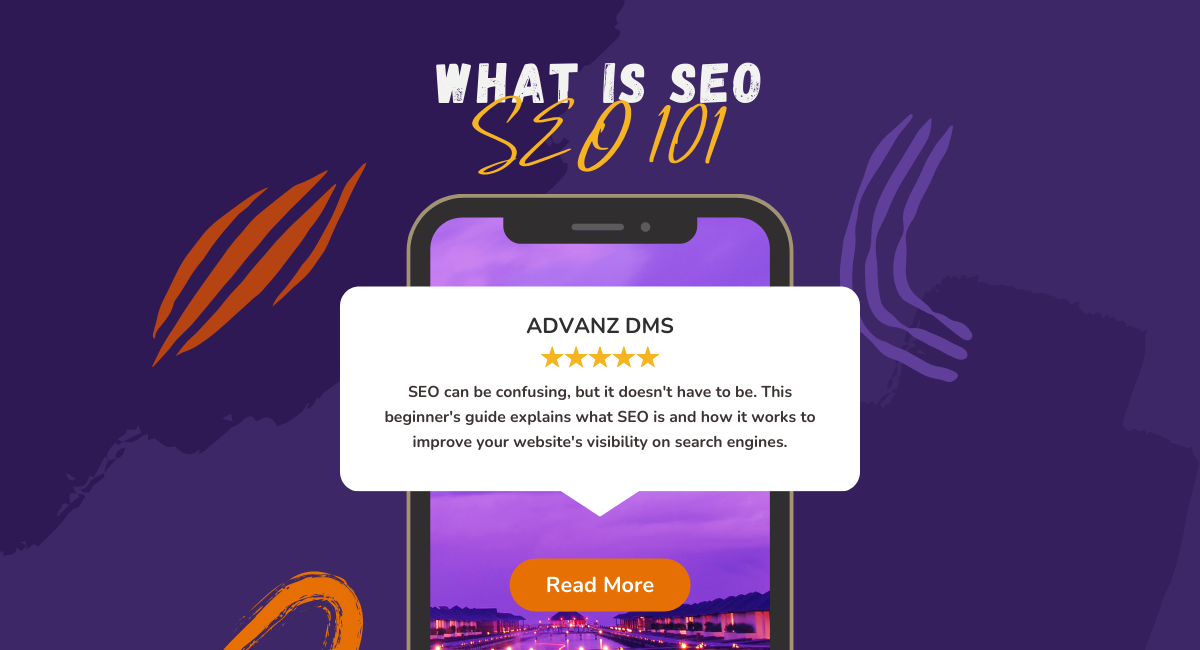Welcome to the exciting world of SEO! If you’re wondering what this buzzword is all about and how it can benefit your website, you’re in the right place. SEO, or Search Engine Optimization, is a digital marketing strategy that helps your website rank higher on search engine results pages (SERPs). In this blog post, we’ll explore what SEO is, how it works, and why it’s important for every website owner. So buckle up and get ready to learn everything you need to know about SEO 101!
What is SEO?
What is SEO? At its core, SEO is the practice of optimizing your website to rank higher on search engine results pages (SERPs). But it’s more than just that. It’s about understanding how search engines work and what users are searching for. By doing so, you can create content that meets their needs and helps them find what they’re looking for.
Search engines use complex algorithms to determine which websites should appear at the top of their SERPs. They take into account factors such as keywords, content quality, backlinks, user experience, and many others. As a website owner or marketer, your goal is to understand these factors and optimize your site accordingly.
The ultimate goal of SEO is to drive organic traffic to your website – that is visitors who find you through unpaid search results rather than paid advertising. By improving your rankings on SERPs, you can increase visibility for your brand or business and attract more potential customers or clients.
How Does SEO Work?
SEO works by optimizing your website to rank higher in search engines. Search engines have a complex algorithm that determines the relevance of websites based on different factors such as keywords, content quality, user experience, and backlinks.
To start with SEO, you need to identify relevant keywords for your website and optimize them within the content. You should also ensure that your website is mobile-friendly, easy to navigate, and loads quickly.
In addition to on-page optimization, it’s important to build high-quality backlinks from other reputable websites. This can be achieved through guest posting or creating shareable content that naturally earns links.
SEO is an ongoing process that requires monitoring and tweaking over time. It may take some time before you see significant results but with patience and consistency, your efforts will pay off in increased traffic and improved visibility online.
SEO is essential for any business looking to establish a strong online presence and attract more customers through its website.
How do search engines work?
Search engines are complex programs that use algorithms to crawl and index websites. They collect data from billions of web pages, organize it, and present it to users in search results.
The process begins with a user typing a query into the search bar. The search engine then uses its algorithm to analyze all the relevant web pages in its database and rank them based on their relevance to the user’s query.
Search engines look for various factors when ranking web pages such as website content, keywords used, backlinks, page speed, domain authority, and how mobile-friendly they are.
One of the most important factors is keywords. Search engines scan through every word on a webpage looking for clues about what it’s about so that they can determine how best to categorize them.
Another important factor is links pointing toward your site (backlinks). When other authoritative sites link back to you or share your content via social media platforms this indicates that your website has valuable information for readers.
Understanding how search engines work is crucial if you want your website to be visible online. By optimizing your website using SEO techniques like keyword research or building quality backlinks will help improve visibility in SERPS which means more potential customers finding you online.
The Benefits of SEO for Your Website
The benefits of SEO for your website are numerous, and they can have a significant impact on your online presence. With an effective SEO strategy in place, you can improve your website’s visibility and attract more traffic to your site.
One of the main benefits of SEO is that it helps you rank higher in search engine results pages (SERPs). By optimizing your website for relevant keywords and phrases, you increase the likelihood that potential customers will find you when searching for products or services related to your business.
In addition to improving rankings, SEO also helps build trust with users. When people see that your site ranks highly in search results, they are more likely to believe that it is a trusted source of information. This can lead to increased brand recognition and customer loyalty over time.
Another benefit of SEO is its cost-effectiveness. Unlike other forms of digital marketing such as paid advertising or social media marketing, which require ongoing investment, once established, an effective SEO strategy can continue generating traffic long after initial efforts have been made.
Incorporating good SEO practices into your website can help drive organic traffic growth while building trust with potential customers – both essential components for any successful online business today.
How to Optimize Your Website for SEO
Optimizing your website for SEO can seem like a daunting task, but it’s essential if you want to attract organic traffic. Here are some tips on how to optimize your website for SEO:
1. Conduct keyword research: Start by researching the keywords that people use when searching for products or services similar to yours.
2. Optimize your content: Use those keywords in your content’s titles, meta descriptions, and body text. Make sure that your content is easy to read and engaging.
3. Build quality backlinks: Backlinks from reputable sites signal search engines that other websites find value in what you offer.
4. Improve site speed: A slow-loading site will negatively affect user experience, leading visitors to exit before they even see what you have to offer.
5. Ensure mobile-friendliness: Over 50% of internet users access the web through their phones; optimizing mobile usability signals search engines that you care about user experience regardless of the device used.
Implementing these strategies into your website optimization plan, not only will it lead to higher rankings on SERPs (search engine result pages), but also increase overall engagement with potential customers visiting your webpage!
On-page vs. off-page SEO.
When it comes to optimizing your website for search engines, there are two main aspects of SEO that you need to focus on on-page and off-page optimization.
On-page SEO refers to the tactics that you can implement directly on your website in order to improve its visibility and relevance for specific keywords. This includes things like optimizing your title tags, meta descriptions, and header tags, as well as ensuring that your content is high-quality and relevant.
Off-page SEO, on the other hand, deals with factors external to your website that can still impact its ranking in search results. This often involves link-building strategies such as guest blogging or reaching out to influencers in your industry.
While both types of optimization are important for improving your website’s visibility online, it’s worth noting that they require different approaches. On-page SEO tactics tend to be more technical in nature while off-page strategies require a bit more networking and relationship-building skills.
Ultimately though, the best approach is always going to be one that prioritizes creating high-quality content first and foremost – regardless of whether you’re focusing on- or off-page optimization techniques!
Tools and Resources for SEO
Tools and resources play a vital role in optimizing your website for SEO. They help you analyze your website’s performance, identify errors, and provide suggestions on how to improve its ranking.
One of the essential tools for SEO is Google Analytics. It provides valuable insights into the behavior of visitors on your site, including their demographics, interests, and location.
Another useful tool is SEMrush. It allows you to analyze competitor websites and find keywords that can help attract traffic to your site. You can also use SEMrush to track keyword rankings over time.
A Yoast SEO plugin is another popular tool that helps optimize content for search engines. The plugin checks for readability, meta descriptions, title tags, and other crucial elements required by search engine algorithms.
Moz Pro offers detailed reports on-page optimization opportunities through its crawler feature which identifies technical issues impacting visibility as well as provides recommendations based on identified data points like backlinks analysis or page speed score among others.
Other tools include Ahrefs which focuses more heavily on link-building strategies; Siteliner used primarily for identifying duplicate content within a specific domain; Screaming Frog used predominantly with technical audits of sites via crawling software – just naming but a few!
The options available are many depending on what specifically needs attention across an array of potential issues such as accessibility & mobile-friendliness or areas where competition could be improved upon – all contributing towards best practice approaches when it comes down to not only having good content but ensuring it gets seen!
Keyword research and optimization.
Keyword research and optimization is an integral parts of any successful SEO strategy. It helps you identify the words and phrases your target audience uses when searching for content related to your website, while optimization involves incorporating those keywords into your website’s content.
To begin with, keyword research, start by brainstorming a list of relevant topics related to your website’s offerings. Then use keyword research tools like Google Keyword Planner or Ahrefs Keyword Explorer to find search volume data on those topics.
Once you have identified high-volume keywords, it is important to incorporate them naturally into your website’s content. This includes optimizing page titles, meta descriptions, heading tags, and body text with relevant keywords.
However, it’s essential not to stuff too many keywords in the content as that can harm the user experience and lead to penalties from search engines. Aim for a natural flow of language that makes sense both for users and search engines alike.
By conducting thorough keyword research and strategically optimizing your website’s content accordingly – you will help increase visibility on SERPs (search engine results pages) which will ultimately drive more organic traffic toward your site!
Frequently Asked Questions About SEO
Frequently Asked Questions About SEO
1. How long does it take for SEO to work?
SEO is a long-term process, and the time it takes to see results varies based on many factors such as the age of your website, the competition in your industry, and your keyword strategy. In general, it can take anywhere from three months to a year or more before you start seeing significant improvements in your search rankings.
2. Do I need an SEO expert to optimize my website?
While you don’t necessarily need an SEO expert to optimize your website, hiring one can be beneficial if you’re unfamiliar with how SEO works or don’t have the time or resources to do it yourself. An experienced SEO professional can help you develop a custom strategy tailored specifically to your business needs.
3. Is link building still important for SEO?
Yes! Backlinks are still an essential component of any successful SEO strategy. However, not all links are created equal – quality matters over quantity when it comes to link building.
4. Can social media impact my search rankings?
While social media presence doesn’t directly impact search engine rankings, having active profiles on popular platforms like Facebook and Twitter can help drive traffic back to your site and increase brand awareness.
In conclusion,
Understanding what is seo and how it works is vital for any website owner who wants their online content visible to targeted audiences searching through organic query methods on most major search engines today.
Implementing strategies that focus on optimizing both on-page elements (such as keywords) along with off-page optimization techniques like backlinking campaigns designed specifically around high-quality relevant content will guarantee better visibility within SERPs over time – leading towards higher traffic rates & potential revenue growth opportunities down-road!





